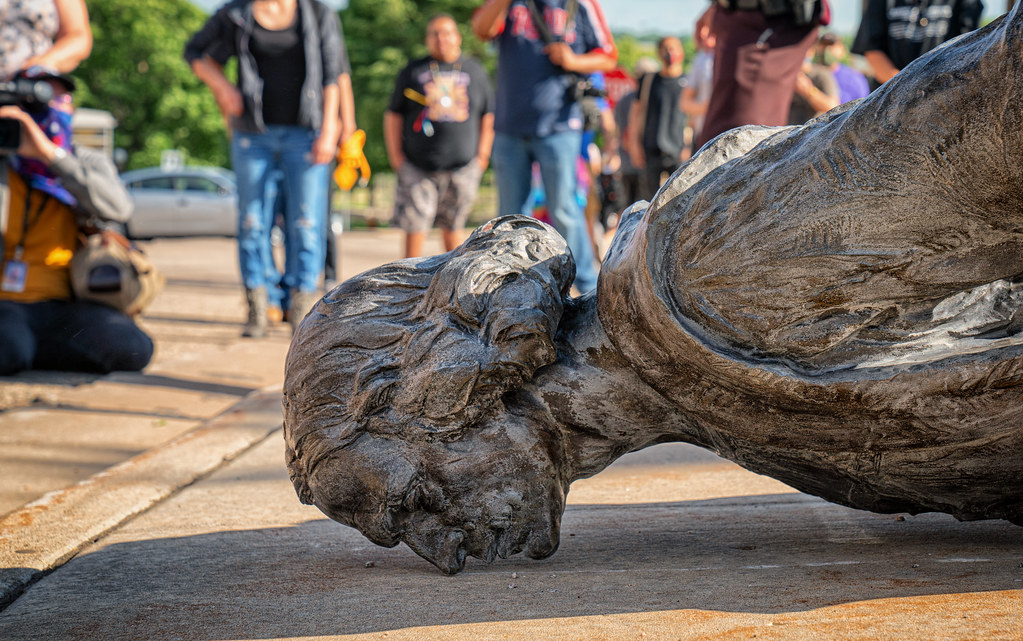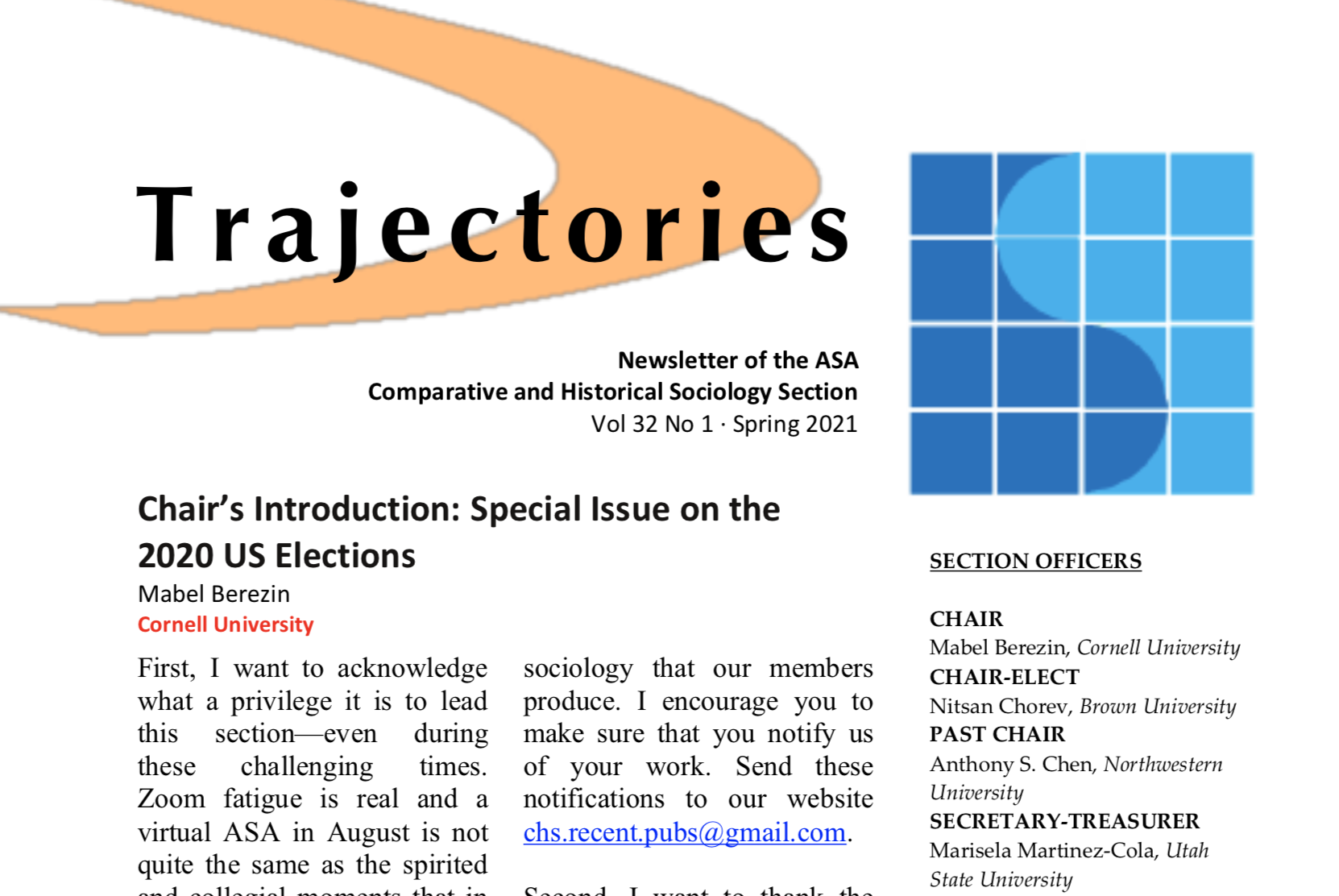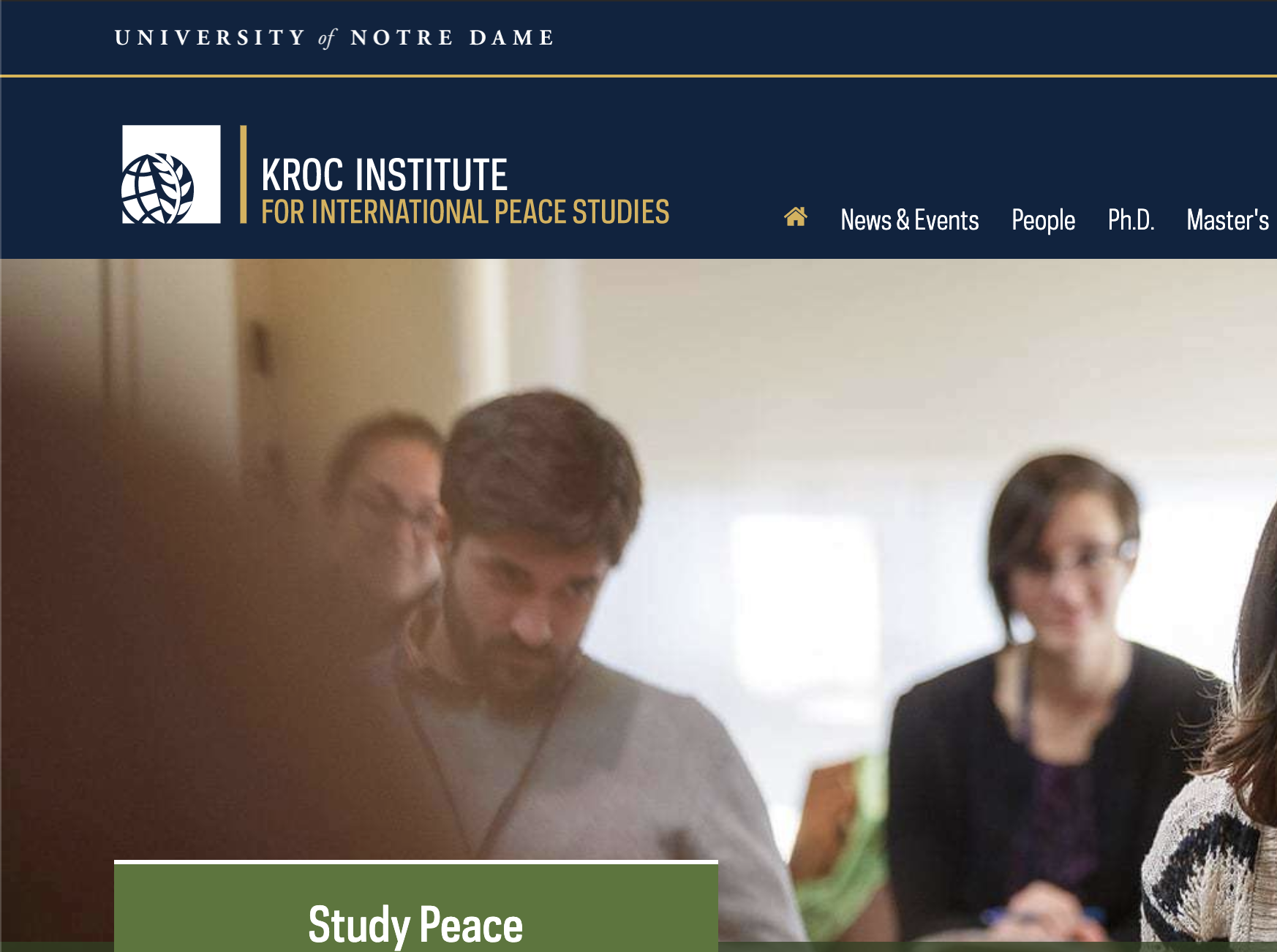Simeon J. Newman (University of Michigan)
Stephanie Mudge (University of California, Davis) and Anthony Chen (Northwestern University) recently assumed the editorship of Studies in Historical Sociology, a new book series by Cambridge University Press. Since this development is likely to be of broad interest to historical sociologists, I approached them for an interview. I was interested to know their views about historical sociology in general and their vision for the series in particular. Here’s what they said.
Question: What are your views about the current state of historical sociology? What do you like about it? What trends worry you?
Mudge: I think historical sociology is doing great — expanding its horizons geographically and temporally, taking up new topics (and old topics in new ways). I’m especially excited about the potential to finally, and hopefully permanently, blur the hard line that is sometimes drawn between quantitative versus qualitative methods in historical research. The trend that worries me, and which I hope this new series will help to address, is the dispersion of works of historical sociology across topical fields, rather than having a shared home for historical sociological work — and, more importantly, a shared conversation.
Chen: I’m greatly heartened by the growing number of talented, young sociologists who are choosing to take a historical approach to their sociological investigations. Giving them a place to publish their best work is definitely one of the key motivations for launching the series.
Question: What do you expect the near future to hold for the field? What kinds of books would you most like to publish? I’m sure you don’t expect submissions to conform to your every wish. But what are your wishes?
Chen: I think we would most like to publish books that make high-quality contributions to historical sociology, broadly conceived. This means, among many other things, books that raise important new questions, books that provide original and compelling evidence of theoretically meaningful claims, books that change our angle of vision on a well-tilled problematic, books that significantly shift the conversation in a certain area of inquiry, or books that introduce innovative theories or concepts that deserve wide exploration. We certainly have our own interests and preferences, and naturally, we would be delighted if books that fit them wind up getting published. But what we care the most about is quality.
Mudge: There are many ways of writing great works of historical sociology. I’m particularly interested in seeing manuscripts that are outstanding in terms of careful, explicit theoretical grounding, and attention to matters of explanation. I also hope to see plenty of submissions that push out historical sociology’s boundaries in terms of topics, time periods, geographies, concepts, and methods. Last but not least, given the crisis-ridden historical moment in which we now find ourselves, I’d love to see work that has the potential to be public-facing — that is, work that can be translated into journalistic formats and op-eds for general audiences, informing contemporary debates about how to think about the past and orient ourselves toward the future.
Question: In recent years, historical sociologists have turned to primary sources much like those with which historians often work. Will this orientation persist? How important do you feel primary sources will be to the historical sociology of the future?
Chen: I hope that serious research using primary sources is here to stay for the long term in historical sociology. But I wouldn’t want to see it become an object of fetish or a badge of authenticity. Working with primary sources is indispensable to historicizing (by which I roughly mean “placing into historical context”) many different pieces of your analysis, ranging from what you are trying to explain (or interpret) to what you think is propelling the causal or interpretive action. It is essential to reconstructing and setting into spatial and historical context the things specific people said, did, or thought. But it is certainly possible for historical sociologists to gratuitously cite primary sources they don’t need. At the same time, there are plenty of talented and important historians who have done spadework of their own in the primary sources, and historical sociologists risk reinventing the wheel if they fail to become familiar with the relevant historiography before citing everything they found during their plunge into the archives.
Mudge: I’m sure the turn to primary sources will persist, though perhaps in new forms, especially considering the expansion of digital archival resources and materials, new tools for translation, and computational “big data” modes of analysis. I completely agree with Chen that, at the same time, we should be wary of fetishizing primary sources — and in particular “the archive.” History is everywhere around us, and the empirical resources historical sociologists use should reflect that — while always attending, at the same time, to questions of the quality and appropriate use of different kinds of empirical sources. I also think it’s important that historical sociologists recognize the value of existing historical scholarship, across the human sciences — and build on it.
Question: What about comparison? During a previous era, historical sociologists defended the field against naysayers, in part, by asserting that comparison made the enterprise scientific. Few of those naysayers remain vocal, and practitioners seem to oscillate between calling the field “comparative-historical sociology” and just “historical sociology.” Indeed, the word “comparison” doesn’t even feature in the name of the series you’re editing. Is comparison still a good thing? If it is no longer needed to assuage doubts, what, if any, laudable ends does it continue to serve? And how much comparison is too much comparison (and not enough history)?
Mudge: My feeling on comparison is the same as my broader position on all matters of method: it should be appropriate for the question, and grounded in the history of the subject matter. Comparison is one of the most powerful tools in the historical sociologist’s toolbox, but there’s no use in doing comparison for comparison’s sake.
Chen: Comparison has a place in the intellectual armamentarium of historical sociology. It’s often a good thing to do; it’s often the right thing to do. But I’m not wedded to a single conception of comparison, and I don’t think it’s the only rigorous method of analysis or the only method of analysis capable of generating high-quality empirical evidence of sociologically meaningful claims. Generally speaking, I think of comparison as a powerful subset of “small-N” approaches that have a strong family resemblance, but to me it is far from the only important family of approaches out there. As for whether comparison serves laudable ends, I think it can serve laudable ends in the same manner that every other analytical approach can serve laudable ends — when it is applied to questions or problems that it is well-suited to addressing. There cannot be, there should not be “one (methodological) ring to rule them all,” in my view. Of course, abjuring Methodenstreit is one way that sociologists signal their intellectual sophistication. That’s not my intent. Our quarrels over method — and epistemology even more fundamentally — continue to recur over the generations, and I don’t see myself operating above the fray any more than anyone else is. I suppose my point is that our ideas about methods and epistemology change dynamically, and our critical appraisal of different investigative approaches (what is strong or weak about them) change dynamically as well. We should lean into these conversations as historical sociologists and then make the best methodological choices we can at the moments we need to make a choice. Right now, for a lot of historical sociologists, some form of comparison continues to make strong sense — and for good reasons.
Question: Will sociology books keep getting shorter? When does a contribution merit 100,000 words, and when does one merit (or suffer from) twice that? Clearly publishers have their preferences. But what considerations would lead you as series editors to recommend that a work go to press with more words (or with fewer)?
Chen: Books should be as long as they need to be, no longer and no shorter. Of course, it’s easy enough to say that. It can be hard to make a call about length when a decision is needed. That being said, I think authors should be given the length they require to make whatever high-quality contribution they are aiming to make. If they can’t make their high-quality contribution without going longer, then they should go longer. But if they can make their high-quality contribution in 75,000 words, then 75,000 words (or whatever number) is what they should aim for. I am definitely sympathetic to the argument that certain types of high-quality contributions require a great deal of space. For instance, if a manuscript were based on the discovery of several hitherto untapped manuscript collections and if presenting detailed findings from a close reading of these manuscripts were essential to making a strong case, I could see myself recommending more words. At the same time, if multiple passages of a book manuscript strike me as redundant or irrelevant or insignificant, I would be less receptive to raising the word limit.
Mudge: For me, the key considerations are scope, methods, audience, and the quality of the writing. More words make sense when the writing is well-crafted and the book is ambitious in terms of empirical scope, theory, and methods. Multiple cases, long time periods, multiple forms of evidence, narrative modes of analysis, and highly technical work requiring careful explanation are all good reasons for a slightly longer book — that is, as long as the writing is as clear and tight as possible. Finally, a lengthier book may also make sense when it is oriented toward multiple audiences — that is, multiple disciplinary audiences and/or both academic and public audiences — but, if so, there needs to be a very good road map at the beginning.
Question: How do you weigh a book’s empirical vs. its theoretical contribution? How much case evidence is too much? And at what point does a theoretical apparatus overpower a historical-sociological contribution?
Mudge: Great works in historical sociology inform our understanding of the unfolding of specific processes, in specific times and places, while also drawing out implications in ways that travel to other processes, times, and places. To me this means that the weight and importance of an empirical contribution depends a great deal on how well the analysis is framed theoretically and, more importantly, whether the theoretical perspective makes the analytical story possible — that is, whether it provides a way of thinking and a conceptual vocabulary that drives the questions asked, the evidence gathered, and the explanations advanced. I think it’s not too hard to tell when theory is doing real work, and when it is not. As regards ‘too much’ case evidence: if a book is tightly formulated, the author’s rules of evidence are clear, and there is evidence that bears clearly and directly on an explanatory argument, then I’m not sure there can be too much.
Chen: It’s definitely the case that books can be too theory-heavy. But it’s also the case that they can be too theory-light. There are so many different types of books, and many different ways to strike a sensible balance. As a general rule, if a book is clearly and compellingly motivated — that is, if a strong intellectual justification for the project is laid out at the outset, it is usually straightforward to identify the right balance between theory and evidence. Often, it’s when the motivation for a book is not clearly formulated or articulated that imbalances crop up.
Question: Historical sociology is mostly a subtype of political sociology. Assuming you agree, how do you feel about that? Does this represent a strength or a weakness?
Mudge: I think this is broadly true historically, at least in terms of how historical sociologists have tended to define themselves and their subject matter. But there is a great deal of historical work that is not centrally about politics or political institutions — in economic sociology, sociology of science and knowledge, the sociology of race, and cultural sociology, for instance. The human world unfolds in a historical way, and so my position is that historical sociology’s topical net should be cast very widely. I would like to cultivate a series that cuts across topical subfields, showcasing the breadth and strength of historically-minded sociological analysis.
Chen: I agree. I think that historical sociology these days is much more than a subtype of political sociology, although a great many historical sociologists are interested in power and politics. This breadth is a strength. Historical sociologists are free to follow their sociological imaginations and investigate a wide range of outcomes and processes. But this breadth is also a weakness. It can obviously exacerbate some of the centrifugal forces that run through the subfield. We were partly motivated to propose the series in order to counteract these centrifugal forces by establishing a common intellectual venue where the most exciting, agenda-setting books in historical sociology might be published.
Question: Are there major topics that have not featured prominently enough in American historical sociology that you envision entering its purview and becoming major concerns?
Mudge: I’d frame this a little differently; I’d say that among authors who do historical work, not enough of them identify themselves, specifically, as historical sociologists. I hope that this series provides a space for authors who approach the formulation of questions and the analysis of evidence historically, in a temporally-sensitive way, who might ordinarily consider themselves topical specialists, to situate themselves also under the (hopefully) ever-broadening tent of historical sociology.
Chen: Not surprisingly, I agree with Mudge. There is important scholarship that not only takes a historicist approach to defining and investigating problems of sociological interest, but also touches directly on the interests and concerns of historical sociologists. In many cases, such scholarship straddles historical sociology and another subfield. Yet it is only faintly identified as historical sociology. We hope the establishment of the Studies in Historical Sociology series gives future authors of such work the intellectual opportunity and professional incentive to engage with historical sociology more fully than they might have had in the past.
Question: There is sometimes a perception that historical sociology is an elite affair. And yet many of the scholars who had the largest impact on sociology in the past developed theoretical models of processes and outcomes, much as historical sociologists do today. What do you make of this? Is historical sociology a luxury? Is it just rudimentary? Or is it something else altogether?
Mudge: This is such an important conversation to have! If we think history is important for the present, then historical sociology cannot be a luxury; it is essential, and rightfully at the core of the discipline. Whether, why, and to whom it seems inaccessible or closed-off are questions we need to address in conversation, especially, with graduate students and early-career sociologists. The impulse behind the new series is to widen the space for historical-sociological work, to give it a platform and a broad audience — to connect what’s known and knowable about the past with our thinking about the present and future. If, along the way, we’re able to cultivate a conversation about building a renewed, broad-ranging, inclusive historical sociology, I’m all for it. In the meantime, I hope that this series pushes us in the right direction.
Chen: I agree!



